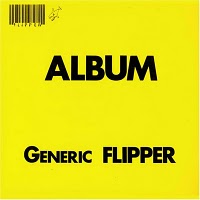 Dirt, drug-fueled, filth-ridden punk is the best way to describe Flipper’s Generic album. It’s not exactly fast paced like many other punk bands of the time, but it makes up for it with its sheer brilliance of heavy sludge guitars and downer lyrics. If you’re looking for in your face sweet talk go else where, this set is devoted to the noise crazed enslaving crowds. And every track plays off the next, ultimately concluding to the epic closer, “Sex Bomb” — which is literally one of the most enthralling songs ever recorded. The whole album is an all filth, visceral, perfect mess. Highly recommended! –Jason
Dirt, drug-fueled, filth-ridden punk is the best way to describe Flipper’s Generic album. It’s not exactly fast paced like many other punk bands of the time, but it makes up for it with its sheer brilliance of heavy sludge guitars and downer lyrics. If you’re looking for in your face sweet talk go else where, this set is devoted to the noise crazed enslaving crowds. And every track plays off the next, ultimately concluding to the epic closer, “Sex Bomb” — which is literally one of the most enthralling songs ever recorded. The whole album is an all filth, visceral, perfect mess. Highly recommended! –Jason
Album Reviews
Charles Mingus “Oh Yeah” (1962)
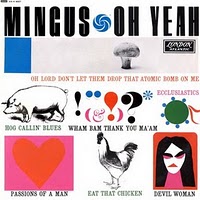 That Mingus had in mind to do something different on this record can be divined by the fact that he plays piano instead of bass here. And he sings … badly. Plus he hires both Roland Kirk and Booker Ervin to play sax — and if you can think of two more disparate players, send your answers on a postcard to me. The end result is one of Mingus’ earthiest, bluesiest, craziest and, well, most unhinged albums; if the songwriting isn’t up to, say, Ah Um, it makes up for it in sheer loopiness. “Passions of a Man” is the most avant-garde and complicated track here, perfectly balanced by the sleazy R&B of “Eat That Chicken”. And who can disagree with the sentiments of “Oh Lord Don’t Let Them Drop That Atomic Bomb On Me”? Unsung hero: Dannie Richmond. Again. –Neal
That Mingus had in mind to do something different on this record can be divined by the fact that he plays piano instead of bass here. And he sings … badly. Plus he hires both Roland Kirk and Booker Ervin to play sax — and if you can think of two more disparate players, send your answers on a postcard to me. The end result is one of Mingus’ earthiest, bluesiest, craziest and, well, most unhinged albums; if the songwriting isn’t up to, say, Ah Um, it makes up for it in sheer loopiness. “Passions of a Man” is the most avant-garde and complicated track here, perfectly balanced by the sleazy R&B of “Eat That Chicken”. And who can disagree with the sentiments of “Oh Lord Don’t Let Them Drop That Atomic Bomb On Me”? Unsung hero: Dannie Richmond. Again. –Neal
Robert Fripp “Exposure” (1979)
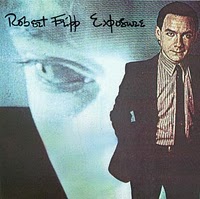 I may be alone in thinking this is a greater record than anything King Crimson ever did, but I shouldn’t be. Here Fripp harnesses his experimental side to actual polished pop songs — nothing here goes much over four minutes — and the cast of thousands is used to good effect. Terre Roche screams her lungs out on the title track, a kind of modernist update of “The Great Gig in the Sky”; Peter Gabriel reprises “Here Comes the Flood”, perhaps the most affecting song either he or Fripp has ever been connected with; and Daryl Hall, of all people, hits the high spot with his wistful voice on the guitar looped “North Star”. It’s the perfect meld of prog-meets-art rock-meets-new wave-meets-soul, and I don’t think it’s a coincidence that it came out in 1979, a time when music had collapsed into a huge melting pot and for a brief moment anything seemed possible (of course it all began to harden into separate genres — very separate — almost immediately). No coincidence, either, that Exposure marks a decade since In the Court of the Crimson King. –Brad
I may be alone in thinking this is a greater record than anything King Crimson ever did, but I shouldn’t be. Here Fripp harnesses his experimental side to actual polished pop songs — nothing here goes much over four minutes — and the cast of thousands is used to good effect. Terre Roche screams her lungs out on the title track, a kind of modernist update of “The Great Gig in the Sky”; Peter Gabriel reprises “Here Comes the Flood”, perhaps the most affecting song either he or Fripp has ever been connected with; and Daryl Hall, of all people, hits the high spot with his wistful voice on the guitar looped “North Star”. It’s the perfect meld of prog-meets-art rock-meets-new wave-meets-soul, and I don’t think it’s a coincidence that it came out in 1979, a time when music had collapsed into a huge melting pot and for a brief moment anything seemed possible (of course it all began to harden into separate genres — very separate — almost immediately). No coincidence, either, that Exposure marks a decade since In the Court of the Crimson King. –Brad
The Holy Modal Rounders “The Moray Eels Eat the Holy Modal Rounders” (1969)
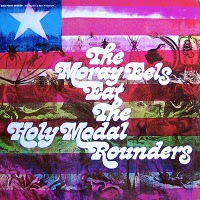 Acid folk? Nope. This is something far stranger: acid country-rock. Acid bluegrass, even. Basically it’s like someone took Live/Dead, Workingman’s Dead, American Beauty and Aoxomoxoa and decided to stick ’em in a blender, then play them all simultaneously, while smoking prodigious amounts of dope and running Easy Rider backwards so a bunch of dead hippies get brought back to life by rednecks with magic rifles. But better. –Brad
Acid folk? Nope. This is something far stranger: acid country-rock. Acid bluegrass, even. Basically it’s like someone took Live/Dead, Workingman’s Dead, American Beauty and Aoxomoxoa and decided to stick ’em in a blender, then play them all simultaneously, while smoking prodigious amounts of dope and running Easy Rider backwards so a bunch of dead hippies get brought back to life by rednecks with magic rifles. But better. –Brad
Billy Cobham “Spectrum” (1973)
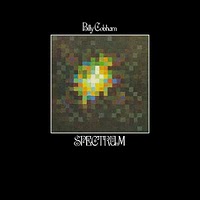 I might be one of the few people who ventured into this album as a Deep Purple fan more than anything else. I’d read that Tommy Bolin’s best work could be found on this album so I wanted to see what all the fuss was about. Since then I’ve found out some more about Mr. Cobham and from “Spectrum” alone, I’m impressed. The band sound really tight on this album and every track bursts with energy. The first track is an absolute mad dash to the end with great soloing and frenetic drumming, but my favorite tracks are “Stratus” and “Red Baron”. Both of these songs have really cool, laid back grooves and the interplay between guitar, keyboard and drums is delightful. After entering into “Spectrum” as a Tommy Bolin fan, I left as a Jan Hammer fan. The keyboard solo’s here are breath-taking, stealing focus from Bolin who is no slouch himself. –Tom
I might be one of the few people who ventured into this album as a Deep Purple fan more than anything else. I’d read that Tommy Bolin’s best work could be found on this album so I wanted to see what all the fuss was about. Since then I’ve found out some more about Mr. Cobham and from “Spectrum” alone, I’m impressed. The band sound really tight on this album and every track bursts with energy. The first track is an absolute mad dash to the end with great soloing and frenetic drumming, but my favorite tracks are “Stratus” and “Red Baron”. Both of these songs have really cool, laid back grooves and the interplay between guitar, keyboard and drums is delightful. After entering into “Spectrum” as a Tommy Bolin fan, I left as a Jan Hammer fan. The keyboard solo’s here are breath-taking, stealing focus from Bolin who is no slouch himself. –Tom
Miles Davis “Water Babies” (1976)
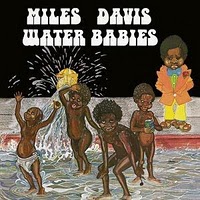 For an album of leftover tracks from the Quintet’s late 60s sessions, this is surprisingly cohesive. Saxophonist Wayne Shorter pens all these tracks and “Two Faced” is the best of the bunch, a stunning, mind melting improvisation featuring Chick Corea providing ethereal washes of electric piano. That track alone is worth getting this album. “Water Babies” and “Sweat Pea” sound radically rearranged from the versions available on Shorter’s solo albums. The former sounds extended and has more percussive elements, the latter transformed into a lovely ballad rather, than the short piece found on Super Nova. –Neal
For an album of leftover tracks from the Quintet’s late 60s sessions, this is surprisingly cohesive. Saxophonist Wayne Shorter pens all these tracks and “Two Faced” is the best of the bunch, a stunning, mind melting improvisation featuring Chick Corea providing ethereal washes of electric piano. That track alone is worth getting this album. “Water Babies” and “Sweat Pea” sound radically rearranged from the versions available on Shorter’s solo albums. The former sounds extended and has more percussive elements, the latter transformed into a lovely ballad rather, than the short piece found on Super Nova. –Neal
Traffic “Mr. Fantasy” (1967)
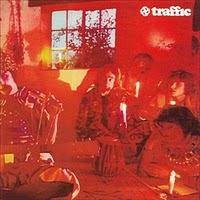 I don’t know whose idea it was to have Steve Winwood start wearing those big shouldered blazers back in the 80s, but that person should be beaten, or maybe put in the stocks medieval style. If Steve himself made this decision, well, I can only put my head in my hands and sigh. I hated his yuppie pop period in the 80s, but this was before I discovered Traffic and the Spencer Davis Group, two bands which definitely changed my view of him considerably. There are so many different versions of this album, but I think I’m covered because I have the reissue which includes the Heaven Is In Your Mind version, which is kind of the same thing, but was only released in the US. Anyway, I like the uniqueness of their sound and the fact they weren’t just another generic hippie dippy psych band. Great nods to jazz and world music, plus interesting uses of flute and sitar. I guess the jazz influence would grow more prominent on subsequent albums. “Dealer” could just be my all time favourite Traffic song with its Spanish style guitar. Just Beautiful. –Neal
I don’t know whose idea it was to have Steve Winwood start wearing those big shouldered blazers back in the 80s, but that person should be beaten, or maybe put in the stocks medieval style. If Steve himself made this decision, well, I can only put my head in my hands and sigh. I hated his yuppie pop period in the 80s, but this was before I discovered Traffic and the Spencer Davis Group, two bands which definitely changed my view of him considerably. There are so many different versions of this album, but I think I’m covered because I have the reissue which includes the Heaven Is In Your Mind version, which is kind of the same thing, but was only released in the US. Anyway, I like the uniqueness of their sound and the fact they weren’t just another generic hippie dippy psych band. Great nods to jazz and world music, plus interesting uses of flute and sitar. I guess the jazz influence would grow more prominent on subsequent albums. “Dealer” could just be my all time favourite Traffic song with its Spanish style guitar. Just Beautiful. –Neal
The Magnetic Fields “69 Love Songs” (1999)
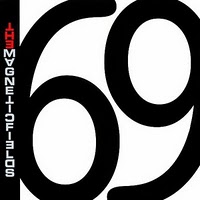 Before I bought this three disc set, I had downloaded some tracks from the collection and included them on various playlists. As a result, I had different favorites over time, falling in love with various tracks as they embedded themselves into my psyche. When I finally heard all the songs together I was blown away at the uniqueness of all these tracks. There’s a lot here that works well together – simple instrumentation (some acoustic, some electro), alternating vocalists, dry humour, classic pop songwriting – Merritt is definitely one of the stellar songwriting voices of his generation. There’s just the right amount of cheese here too, not too much but just enough to at least deflate things when they become too serious. Some favourites include “When My Boy Walks Down The Street”, “Reno Dakota”, “Washington DC” and “Zebra”. Merritt should really turn these songs into some sort of musical because love is well..universal, and rightfully should be celebrated with song and dance. We see the theme of love here revealed, warts and all, with all its betrayals, bliss, rejection, infatuation, etc. This certainly isn’t Julio Iglesias territory, although it would be nice to hear the famous Latin Lover croon his way through “How Fucking Romantic.” –Neal
Before I bought this three disc set, I had downloaded some tracks from the collection and included them on various playlists. As a result, I had different favorites over time, falling in love with various tracks as they embedded themselves into my psyche. When I finally heard all the songs together I was blown away at the uniqueness of all these tracks. There’s a lot here that works well together – simple instrumentation (some acoustic, some electro), alternating vocalists, dry humour, classic pop songwriting – Merritt is definitely one of the stellar songwriting voices of his generation. There’s just the right amount of cheese here too, not too much but just enough to at least deflate things when they become too serious. Some favourites include “When My Boy Walks Down The Street”, “Reno Dakota”, “Washington DC” and “Zebra”. Merritt should really turn these songs into some sort of musical because love is well..universal, and rightfully should be celebrated with song and dance. We see the theme of love here revealed, warts and all, with all its betrayals, bliss, rejection, infatuation, etc. This certainly isn’t Julio Iglesias territory, although it would be nice to hear the famous Latin Lover croon his way through “How Fucking Romantic.” –Neal
John Coltrane “My Favorite Things” (1961)
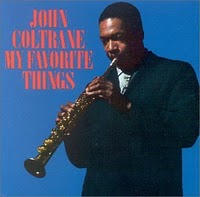 If ever there was a document to the genius of Trane it is the title track here. He takes a perky little Rogers and Hammerstein number and infuses it with Indian influences and extends it to thirteen of the most intense minutes of listening pleasure ever. No wonder it become Trane’s most requested and loved piece. This album features three other standards given the Trane treatment but lets be honest My Favorite Things is the highlight. The LP also introduces us to the Soprano sax that Trane so favored at times. A hard instrument to love unless in the right hands he plays it with his usual ferocity and vigor and makes it sing and cry like no else has ever done. Also, listen to the work of McCoy Tyner on the title track. Has he ever sounded better. His work on this track makes the hairs on the back of my neck stand up every time I hear it. –Jon
If ever there was a document to the genius of Trane it is the title track here. He takes a perky little Rogers and Hammerstein number and infuses it with Indian influences and extends it to thirteen of the most intense minutes of listening pleasure ever. No wonder it become Trane’s most requested and loved piece. This album features three other standards given the Trane treatment but lets be honest My Favorite Things is the highlight. The LP also introduces us to the Soprano sax that Trane so favored at times. A hard instrument to love unless in the right hands he plays it with his usual ferocity and vigor and makes it sing and cry like no else has ever done. Also, listen to the work of McCoy Tyner on the title track. Has he ever sounded better. His work on this track makes the hairs on the back of my neck stand up every time I hear it. –Jon
Van Halen “Van Halen” (1978)
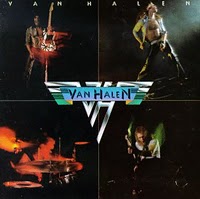 Born from the clubs of LA’s Sunset Strip, Van Halen is a manifesto of life lived in the extreme – hot nights in pursuit of booze and babes, all else be damned. An album that embodies rock’s basic love of wild, party-hearty recklessness with a shot of danger, Van Halen’s personality lives and breathes it’s two frontmen, as over a rock solid rhythmic foundation laid down by Michael Anthony and Alex Van Halen, Eddie dances on a six-string, nickel plated tightrope, while Diamond Dave gives his best peacock impression throughout the classic disc. Decades later, Eddie’s seemingly second-nature abilities still astonish, while Roth is from a land that time forgot, possessing a sense of showmanship and confidence that simply wouldn’t make it past today’s thought police. Van Halen’s timelessness is insured by this cocksure combo of intoxicated revelry and overflowing talent. A solid half of Van Halen has become ubiquitous: “Ain’t Talkin’ About Love,” the steamy “Runnin’ With the Devil,” hard rock candy of “Jamie’s Cryin’,” prowling “Feel Your Love Tonight,” and the smirking cover of The Kinks’ “You Really Got Me.” But the rest of the disc is just as stellar, featuring the blazing “On Fire,” high voltage aggression of “Atomic Punk” and “I’m the One,” jokey blues strutter “Ice Cream Man,” and the blurry-eyed “Little Dreamer.” And one can’t forget “Eruption,” a two minute, tossed-off guitar stunt suited perfectly to this album’s blaring braggadocio. Ted Templeman’s production breathes with a sweaty, live energy, and with it’s bulletproof lineup, Van Halen rolls down the boulevard crusin’ for action, it’s wares on full display, ready to take on all comers. –Ben
Born from the clubs of LA’s Sunset Strip, Van Halen is a manifesto of life lived in the extreme – hot nights in pursuit of booze and babes, all else be damned. An album that embodies rock’s basic love of wild, party-hearty recklessness with a shot of danger, Van Halen’s personality lives and breathes it’s two frontmen, as over a rock solid rhythmic foundation laid down by Michael Anthony and Alex Van Halen, Eddie dances on a six-string, nickel plated tightrope, while Diamond Dave gives his best peacock impression throughout the classic disc. Decades later, Eddie’s seemingly second-nature abilities still astonish, while Roth is from a land that time forgot, possessing a sense of showmanship and confidence that simply wouldn’t make it past today’s thought police. Van Halen’s timelessness is insured by this cocksure combo of intoxicated revelry and overflowing talent. A solid half of Van Halen has become ubiquitous: “Ain’t Talkin’ About Love,” the steamy “Runnin’ With the Devil,” hard rock candy of “Jamie’s Cryin’,” prowling “Feel Your Love Tonight,” and the smirking cover of The Kinks’ “You Really Got Me.” But the rest of the disc is just as stellar, featuring the blazing “On Fire,” high voltage aggression of “Atomic Punk” and “I’m the One,” jokey blues strutter “Ice Cream Man,” and the blurry-eyed “Little Dreamer.” And one can’t forget “Eruption,” a two minute, tossed-off guitar stunt suited perfectly to this album’s blaring braggadocio. Ted Templeman’s production breathes with a sweaty, live energy, and with it’s bulletproof lineup, Van Halen rolls down the boulevard crusin’ for action, it’s wares on full display, ready to take on all comers. –Ben
The Smiths “The Smiths” (1984)
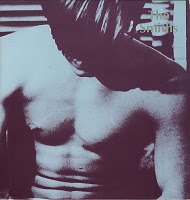 If Smiths fans had a propensity for violence, I would’ve been beaten up quite a bit in middle school. You see, I was eleven and quite liked Bon Jovi – might as well get that skeleton out of the closet now. The most I got from the older Smiths fans at school (and ooh they ever were soo cool) were dirty looks or eye rolls. Well, whatever…I don’t like Bon Jovi anymore (don’t hate ’em either, they seem like nice chaps), and do consider myself a Smiths fan, but it wasn’t really anything to do with my school experiences. Enter Morrissey and Marr. The latter’s distinct guitar style is what blew me away first. He comes across as a kind of post punk Roger McGuinn. I guess I realized that one didn’t have to be a “shredder” like Eddie Van Halen to stand out as a good guitarist. Then the Moz…well, not many have managed to duplicate that croon of his have they? I remember the Smoking Popes didn’t sound anything like the Smiths, but their singer had the dry tuneless croon down pat. I find the Moz’s singing on this debut strangely attractive, even funny – especially on “Miserable Lie” on which he eventually gives up singing altogether and just kind of hoots. But everything here is instantly memorable, especially the smash hits on the latter half of the album. –Neal
If Smiths fans had a propensity for violence, I would’ve been beaten up quite a bit in middle school. You see, I was eleven and quite liked Bon Jovi – might as well get that skeleton out of the closet now. The most I got from the older Smiths fans at school (and ooh they ever were soo cool) were dirty looks or eye rolls. Well, whatever…I don’t like Bon Jovi anymore (don’t hate ’em either, they seem like nice chaps), and do consider myself a Smiths fan, but it wasn’t really anything to do with my school experiences. Enter Morrissey and Marr. The latter’s distinct guitar style is what blew me away first. He comes across as a kind of post punk Roger McGuinn. I guess I realized that one didn’t have to be a “shredder” like Eddie Van Halen to stand out as a good guitarist. Then the Moz…well, not many have managed to duplicate that croon of his have they? I remember the Smoking Popes didn’t sound anything like the Smiths, but their singer had the dry tuneless croon down pat. I find the Moz’s singing on this debut strangely attractive, even funny – especially on “Miserable Lie” on which he eventually gives up singing altogether and just kind of hoots. But everything here is instantly memorable, especially the smash hits on the latter half of the album. –Neal
Richard Thompson “Henry the Human Fly” (1972)
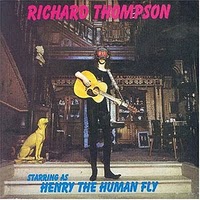 Richard Thompson’s solo debut is, not surprisingly, the one where the chilly folk rock wind of his former band blows most freely, a creaky, moldy affair that matches his stuffy-nosed vocals to a set of weary and ominous songs. The traditional, old world atmosphere of Henry perfectly suits tracks like the fearsome “Roll Over Vaughn Williams,” sorrowful folk ballad “The Poor Ditching Boy,” and drunken “Twisted,” yet also limits the immediate appeal of the album. Elsewhere there’s “The Old Changing Way,” a simple and affecting tale of fragmented brotherhood, while the clouds briefly part with the arrival of Sandy Denny and Linda Peter’s (soon Linda Thompson) vocals on the virtually upbeat “The Angels Took My Racehorse Away,” never mind it’s sentiment of loss. While it’s hard to recommend the soggy sounds of Henry to those who’ve yet to be converted to the doom and gloom of Thompson’s world, it’s also not hard to see why, with it’s distilled purity, it’s become an unlikely favorite. –Ben
Richard Thompson’s solo debut is, not surprisingly, the one where the chilly folk rock wind of his former band blows most freely, a creaky, moldy affair that matches his stuffy-nosed vocals to a set of weary and ominous songs. The traditional, old world atmosphere of Henry perfectly suits tracks like the fearsome “Roll Over Vaughn Williams,” sorrowful folk ballad “The Poor Ditching Boy,” and drunken “Twisted,” yet also limits the immediate appeal of the album. Elsewhere there’s “The Old Changing Way,” a simple and affecting tale of fragmented brotherhood, while the clouds briefly part with the arrival of Sandy Denny and Linda Peter’s (soon Linda Thompson) vocals on the virtually upbeat “The Angels Took My Racehorse Away,” never mind it’s sentiment of loss. While it’s hard to recommend the soggy sounds of Henry to those who’ve yet to be converted to the doom and gloom of Thompson’s world, it’s also not hard to see why, with it’s distilled purity, it’s become an unlikely favorite. –Ben


